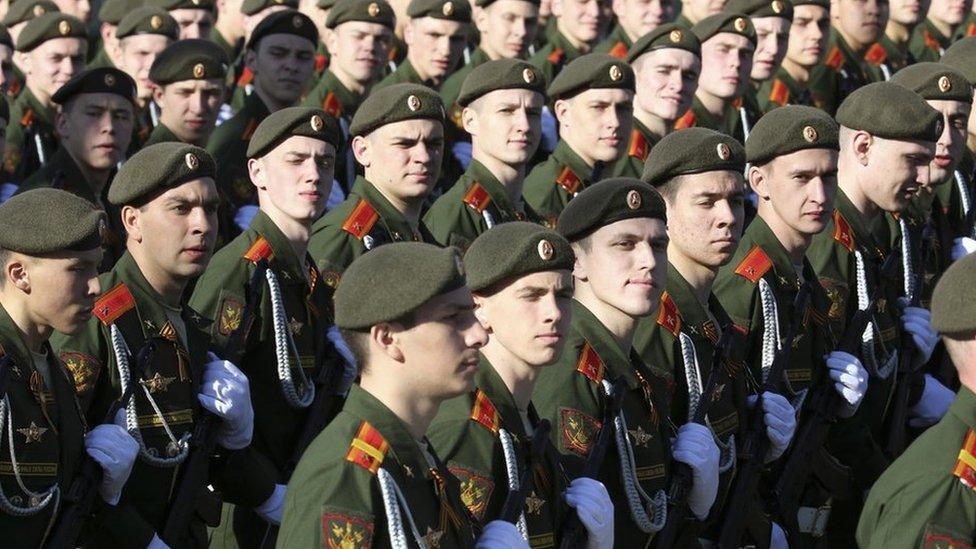BBC correspondents on Victory Day
- Published
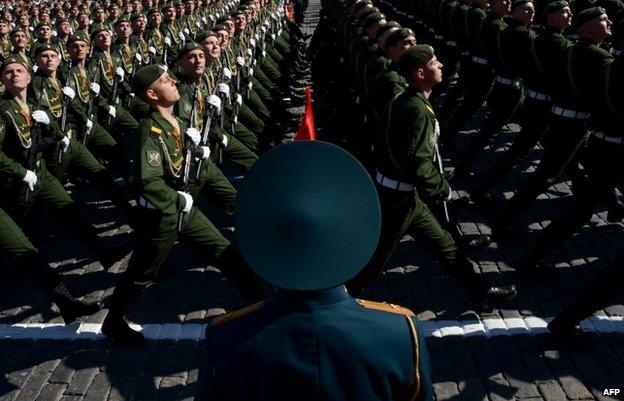
Russia staged its biggest military parade in 20 years, according to state TV
Russia's Vladimir Putin has once again riled Western powers over Ukraine, this time by travelling to Crimea to take part in celebrations marking 69 years since the Soviets defeated the Nazis.
Moscow had earlier put on a parade that state TV said was the biggest display of military might in 20 years. BBC correspondents in Ukraine and beyond reflect on a historic day for Russia, and for its smaller, less powerful neighbours.

David Stern, Kiev
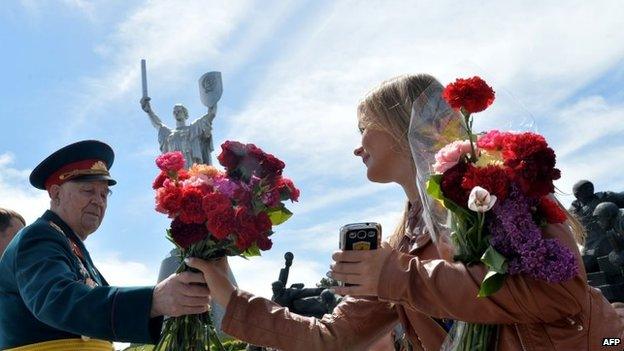
A quiet flower-laying ceremony in Kiev struck a less bombastic note than Moscow's military parade
Despite fears of possible clashes or provocations, Victory Day in Kiev proceeded largely without incident. Two low-key ceremonies took place. In the morning, acting President Olexander Turchynov and Prime Minister Arseniy Yatsenyuk, accompanied by other officials from the new government, laid wreaths at the tomb of the Unknown Soldier. Later, the opposition Party of Regions and Communist party conducted their own modest march to the memorial. About 1,500 people walked in an informal procession, and laid flowers there individually. The ceremony was noteworthy for its lack of political content: no speeches, no chants and a large number of Ukrainian flags.
Victory Day possesses an emotional resonance among many Ukrainians, on a par with that in Russia. Possibly as many as six million people died in Ukraine during the war, and the entire country suffered greatly under Nazi occupation. But Victory Day is also a day of controversy for some. After the war, Soviet forces brutally suppressed a home-grown partisan movement that fought for Ukrainian independence and was at times allied with the Germans.

Chris Morris, Riga
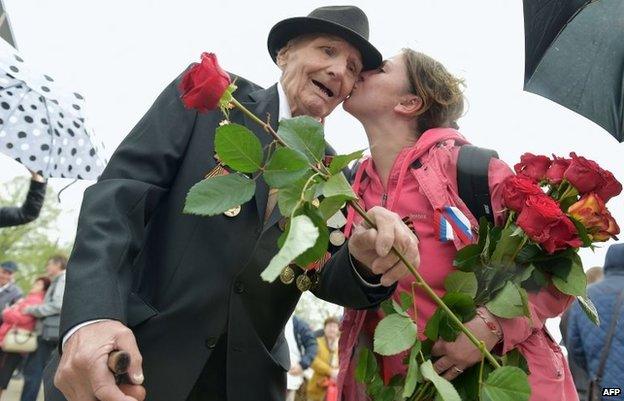
Veterans were out in force in Riga, but not all Latvians see Victory Day as an unadulterated celebration
Russian patriotic songs are playing on loudspeakers; the big screens are showing grainy video of the Red Army from World War Two; and thousands of people are laying flowers at the Victory Monument. Some are veterans wearing rows of medals; others are young people born since the collapse of Communism.
It is not something you see every day in the European Union. But Latvia is a bit of a special case. More than a quarter of the population is ethnic Russian, and about 40% speak Russian as their mother tongue. And this is their day. For people who visit this monument every year - with its stone soldiers carved in heroic poses - it is about celebrating victory and remembering huge sacrifice.
But many ethnic Latvians, who never come here, also see it as a celebration of Russian identity, and a time when Latvia was firmly under Moscow's control. History and identity are always delicate matters in Latvia. But that is true more than ever this year, as Latvia and its Baltic neighbours cast anxious glances at what is happening in Ukraine.

Daniel Sandford, Sevastopol
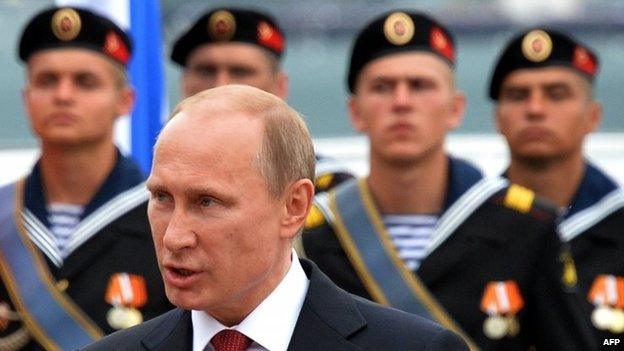
Kiev called Vladimir Putin's Crimea visit a "gross violation of Ukraine's sovereignty"
Victory Day is supposed to be about remembering the sacrifices of World War Two, but today in Sevastopol it became a party. People brought picnics and reserved tables in the restaurants with the best views. Children cheered the soldiers, who marched past wearing their new orange and white ribbon medals, won for "the return of Crimea".
The parade was small but the crowds were huge, and then, after lunch, the Kremlin security men arrived. Slowly the main square was cleared and anticipation grew. Then off a boat stepped President Putin, landing in a city that he says never stopped being Russian.
The people of Sevastopol brought their white, blue and red flags and hailed him like a conquering hero. They were treated to a rare moment when he shook hands. It was an occasion that more than ever brought home the Russian annexation of Crimea. Mr Putin was able to walk unhindered and unchallenged through the main square of a city which the rest of the world believes is still part of Ukraine.

Steve Rosenberg, Moscow
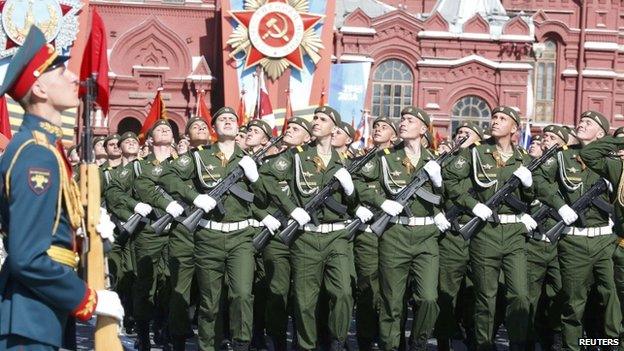
Some 11,000 soldiers marched across Moscow's Red Square
On Red Square there was pomp and there was patriotism. Amid tension with the West over Ukraine, Russia marked Victory Day with a massive military parade.
Eleven thousand soldiers marched across Red Square. Then it was time for the tanks, the armoured personnel carriers and rocket launchers, including some of the most modern military hardware the Russian armed forces have.
Sixty nine military aircraft flew past, to mark the 69th anniversary of the defeat of Nazi Germany. The message for the public at home - Russia is strong and patriotism is positive. The message for the West - Russia is a superpower, don't go down the path of confrontation.
Victory Day is a sacred day in this country. More than 20 million Soviet citizens were killed in World War Two, what is known here as the Great Patriotic War. And, on Red Square, the guests of honour were those who had fought Nazi Germany and survived. Some of them had brought along their grandchildren and great-grandchildren to share their glory.
Addressing the veterans, President Putin said it had been the Soviet people's "iron will" that had saved Europe from slavery. "It was our country," he said, "that had chased the Nazis to their lair".
- Published9 May 2014
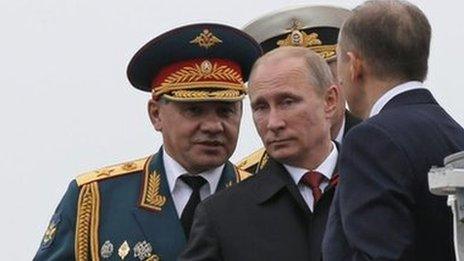
- Published9 May 2014
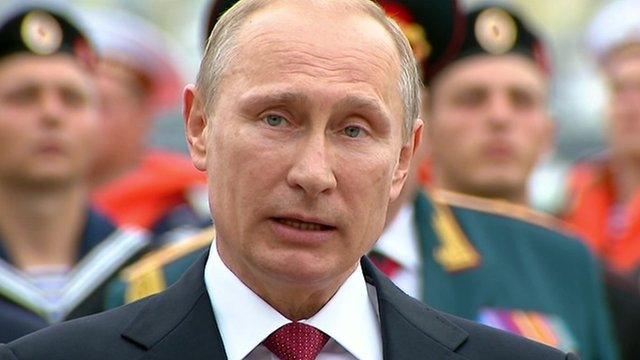
- Published9 May 2014
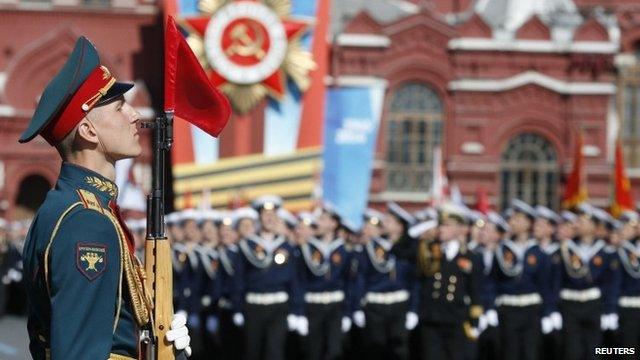
- Published9 May 2014
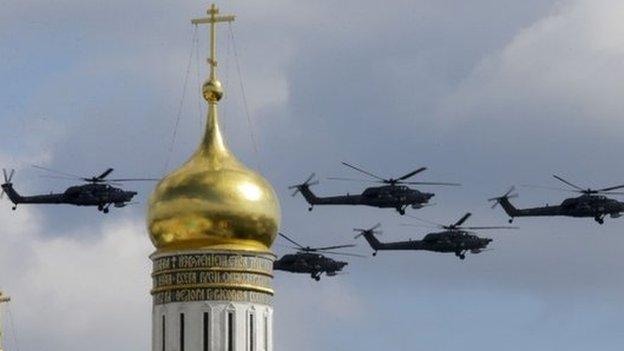
- Published9 May 2014
